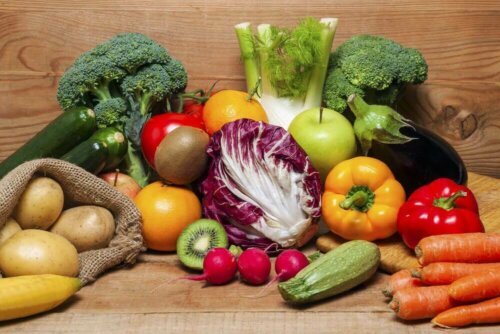5 Tips To Protect Your Liver Health

Protecting your liver health is vitally important, since this organ intervenes in many different bodily functions. However, many factors of our modern-day life can harm it: food additives, toxic habits, pollution, stress, etc.
In this article, we’ll share some tips to protect your liver health. That way you can ensure a better quality of life. Keep reading to find out more!
Why is it important to protect your liver health?
The liver takes part in more than 500 vital functions. These are just some of them:
- It’s in charge of metabolizing macronutrients (carbohydrates, lipids and proteins)
- Regulating blood clotting
- Supporting the immune system
- Intervening in the metabolism of some hormones
- Storing glucose
- In charge of purifying toxic substances in the body
Unfortunately, many factors in our modern-day life can damage liver function. However, hereditary issues and viral infections also play a role. Therefore, it’s always important to take care of your liver health to prevent diseases.
Discover: Five Ways to Revitalize Your Liver, Pancreas, and Kidneys
5 tips to protect your liver health
1. Organic and additive-free food

Food additives aren’t safe. These substances with preservative, fungicidal, coloring, or sweetening properties, among others, cause damage to DNA and different organs. Among them, the liver stands out, which is in charge of eliminating toxic substances from the body.
In this same section we’d like to highlight the importance of avoiding food with pesticides. The only way to achieve this is by eating organic food that you trust or that you grew yourself.
A diet rich in organic vegetables is one way to help detoxify the liver. In particular, you should include raw vegetables, citrus fruits, nuts, and seed oils.
2. Reduce sugar
Obesity and diabetes are two diseases that have increased significantly in recent decades. Although overeating and sedentary lifestyle are two key factors, sugar consumption is also an important factor.
Sugar and all the products that contain it (for example, beverages) directly affect the accumulation of liver fat. This can lead, over time, to fatty liver disease.
Therefore, it’s essential you reduce the amount of sugar in your diet. You can replace it with other sweeteners such as stevia, coconut sugar, xylitol, panela, or pure honey.
Read also: How to Reduce Sugar Consumption
3. Milk thistle
Milk thistle seeds contain silymarin, a very beneficial compound to protect your liver health. Studies show it’s effective in the treatment of different types of liver diseases: cirrhosis, fatty liver, insulin resistance, etc.
Silymarin stands out for its high antioxidant and anti-inflammatory power. Unlike other remedies, this one stands out because it promotes liver regeneration. Using it long-term can be effective in cases of cirrhosis and even in preventing cancer cell metastasis.
4. Control anger to protect your liver health

According to ancient Chinese medicine, all organs have a relationship with emotions. This connection between the body and mind gives us a different perspective to complement any medical treatment.
In the case of the liver, the predominant emotion when you suffer any change in this organ is anger. In other words, fighting anger could help you prevent liver imbalances, along with other good habits.
Although there are no scientific studies that can prove this relationship, psychosomatics shows that emotions do affect our health. Therefore, you should try to enhance positive emotions every day. Also, what harm could it do to live with joy and serenity?
5. A healthy lifestyle
To finish with, and by way of a summary, we want to point out the best way to protect your liver health: a balanced diet and a healthy lifestyle. This includes avoiding tobacco and alcohol, getting a good night’s rest, drinking enough water, and living joyfully.
Putting these tips into practice isn’t easy, since they require important changes in your daily life. However, protecting your liver health will help you live better, and this will be a very worthwhile effort.
All cited sources were thoroughly reviewed by our team to ensure their quality, reliability, currency, and validity. The bibliography of this article was considered reliable and of academic or scientific accuracy.
- Sasaki, Y. F., Kawaguchi, S., Kamaya, A., Ohshita, M., Kabasawa, K., Iwama, K., … Tsuda, S. (2002). The comet assay with 8 mouse organs: Results with 39 currently used food additives. Mutation Research – Genetic Toxicology and Environmental Mutagenesis. https://doi.org/10.1016/S1383-5718(02)00128-6
- Abdelmalek, M. F., & Day, C. (2015). Sugar sweetened beverages and fatty liver disease: Rising concern and call to action. Journal of Hepatology. https://doi.org/10.1016/j.jhep.2015.05.021
- Guan, Y.-S., & He, Q. (2015). Plants Consumption and Liver Health. Evidence-Based Complementary and Alternative Medicine. https://doi.org/10.1155/2015/824185
- Lee, Y.-S., Ryu, Y., Jung, W.-M., Kim, J., Lee, T., & Chae, Y. (2017). Understanding Mind-Body Interaction from the Perspective of East Asian Medicine. Evidence-Based Complementary and Alternative Medicine. https://doi.org/10.1155/2017/7618419
- Feher, J., & Lengyel, G. (2011). Silymarin in the Prevention and Treatment of Liver Diseases and Primary Liver Cancer. Current Pharmaceutical Biotechnology. https://doi.org/10.2174/138920112798868818
This text is provided for informational purposes only and does not replace consultation with a professional. If in doubt, consult your specialist.








